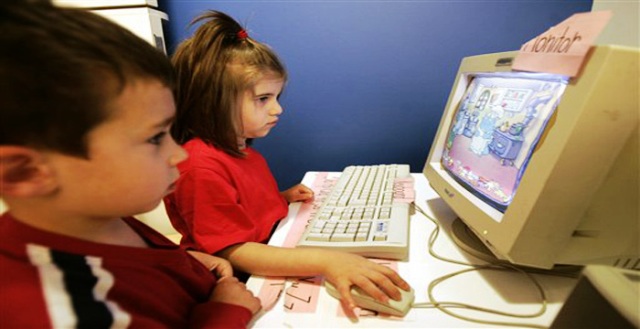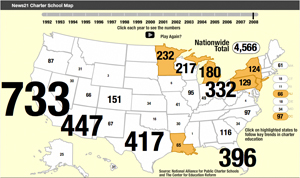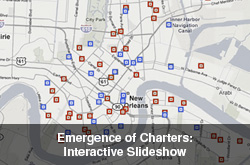Rush into Cyber Space: Are Virtual Charters Any Good?
Kyla Calvert | Jul 30, 2009 | Comments 6

By Kyla Calvert
When public schools open in the fall, more children will have the option of staying home - not for homeschooling, but for virtual schooling, one of the fastest-growing educational trends in the United States.
Beginning this year, every school district in Florida is required to offer an online school option for students living within their boundaries. In New York City, a pilot program this summer offered students the opportunity to follow individualized “playlists” of lessons on their own laptops.
Pennsylvania is home to the nation’s largest virtual school population, with its 20,000 students, and growing. “Eventually, all schools are going to have some kind of cyber component. That’s our belief,” said Eric Woelfel, director of Pennsylvania Cyber Charter’s Eastern Pennsylvania Learning Center. “It’s taking off, not only in Pennsylvania, but in other states as well. We believe it is going to be part of every public school in the state soon.”
Most of Pennsylvania’s schools are run by private companies and organizations. Recently, new charter operators have emerged from an unlikely place to carve out a piece of the virtual school business: local public school districts.
The state’s public school districts had been on record as strong opponents to the rapid growth of virtual schools - they began in 2001 with 5,000 students. In fact, several districts filed a lawsuit in 2002, charging that the schools are not schools at all, but rather home-school programs, thus not entitled to public funds. The Pennsylvania School Board Association lost that suit in Commonwealth Court.
And now it’s come to this. In September, three new cyber schools are expected to open in Pennsylvania public school districts, bringing the state’s virtual total to 14. Each school — shorn of desks, classrooms, and nearly everything else that comes with school buildings — will enroll up to 100 students apiece.
And the reason is simple: money. Some local district officials have decided to get into the virtual school market, in part, because they have seen too much per-pupil money fly out of their budgets and into cyber schools in the last decade.
“The decision to start a virtual schooling program came about because of costs,” said Robin Tedesco, the communications director in the school district of West Mifflin, a town southwest of Pittsburgh.
Last year, West Mifflin school district paid out $651,000 total to charter schools for 44 local students, 40 of whom attended cyber charters, according to Tedesco. These students account for just over 1 percent of the district’s total enrollment. But that number is expected to rise steadily, if the statewide trend is any indication.
Cyber charters receive only 75 percent of the per-pupil rate for each student they enroll, according to Joe Lyons, executive director of communications for Pennsylvania Virtual Charter School. That money comes out of each student’s home district budget. Still, public school administrators argue that 75 percent is 25 percent too much for schools that have no buildings, no sports teams, no music programs nor security offices to maintain.
This fiscal discrepancy is at the heart of another virtual-schooling controversy. At the end of the 2005-2006 school year, Pennyslvania’s 11 cyber charters weighed in with an accumulated surplus of $28 million. State lawmakers balked, saying the surplus proves that virtual schools received far too much money from local districts. In fact, legislators have introduced a bill every year since 2001 that aims to realign charter school financing with more realistic virtual school expenses.
Cyber schooling advocates argue that the districts should not receive that per-pupil money if they are not educating the pupil. “We’re not taking their money,” Lyons said. “It’s the students’ money, it follows them.”
Cyber charters’ students are concentrated around Philadelphia, Pittsburgh and Harrisburg, but there are also significant communities of cyber schoolers in some rural areas, such as Lancaster County and the Lehigh Valley. Each virtual charter school is structured differently, but they all provide an individualized approach that guides children through the curriculum step by step. Virtual students receive computers and printers in addition to textbooks and materials for music, art and science. Some schools send scanners and others give families a stipend to pay for an Internet connection.
Parents act as learning coaches, particularly with younger students. Students follow online lessons that direct them to textbook chapters or describe activities to be done. Some schools offer access to educational games online. Most schools offer live classes at least once a week for each subject. Students can sign in and participate in the lesson with their classmates, or watch a recording of the live lesson whenever is most convenient.
The increasing popularity of cyber schools in Pennsylvania seems to be unrelated to how they actually perform. Most schools’ students pass the state’s grade level math and reading exams at rates 20 percentage points behind students statewide. In 2008 students in only five of the state’s 11 cyber charters surpassed the state average in math or reading. In the highest performing charters–Pennsylvania Learners Online, Pennsylvania Virtual and 21st Century Cyber Charter–students outperformed statewide averages, but only by one grade level.
Cyber school representatives argue that test scores are not necessarily the best indicator of how well cyber students are doing. “Our kids are taken out of their natural environment where they are schooled every day to test in a different environment,” said Lyons. “If you did that in a traditional school you’d see test scores affected by that.”
Parents of virtual charter school students seem less concerned with the schools’ test results than with whether their children’s specific needs being met. Families choose cyber charters for religious, academic, safety or other reasons, and point to the flexibility of their school’s curriculum as a controlling factor.
“There isn’t anything that would make me send my child to a public school,” Oummul ‘Aaishah Khalilah Amatul-Haliym, whose 4-year-old daughter completed pre-kindergarten with Pennsylvania Cyber Charter School this year, said in an e-mail. It’s all about control over family values. “Cyber school allows us the opportunity to have control of what is being taught, she wrote. “If there is something that goes against our religious belief we have the option of opting out of it by signing an affidavit.”
While some families see sending their children to cyber schools as a way to opt out of traditional public education, others see it as the best way for their families to stay connected with public schooling. When Sue Betzenberger saw that her son was breezing too easily through his class work, she considered homeschooling her children. Although she comes from a family of educators, she was not initially comfortable with the idea of teaching them herself.
Now Evan, 10, and his younger sister attend Pennsylvania Virtual Charter School. “This is good for our family,” Betzenberger said. “It allows us a lot of the benefits that homeschooling would, but it is a public school. The curriculum is probably more advanced and more detailed and encompassing than I think I could have come up with on my own.”
Regardless of what initially draws families to cyber charter schools, many say the same thing about why they stay.
“In the classroom, you’re always trying to teach to that midstream,” said Michelle Verga, the mother of three Pennsylvania Virtual Charter School students and the school’s master teacher of co-curricular learning. “Here, where my child already knows how to measure or how to tell time, we can use those lessons as review and we can do maybe two or three a day. But, maybe I have a child that struggles with fractions or maybe they’re not getting a concept in science, so I’m able to slow down.”
Though cyber charter schools are finding favor with many families, permanence on the charter school landscape may well depend upon the schools’ attaining proficiency in performance tests. A study of charter school achievement in eight states released by the Rand Corporation in March found that virtual schools were the only types of charters to have consistently negative results.
“Policymakers should closely examine the performance of virtual charter schools,” according to the Rand study recommendations. It went on to suggest that districts analyze whether kids’ learning is being hurt by the virtual charter methods, and find ways to boost academic performance.
So far, there is little sign that parents, school districts or education companies are concerned about the sluggish test results. Even New York City’s schools chancellor said recently that online education is the future of public education. And the question remains: what will that future look like?
Filed Under: Pennsylvania • Unchartered Territory
About the Author:














Hai bro Good Evening.I am agree with your blog article about that but i found something strange that i felt you did not know the main problem before you posting this so i want to ask :where do you know about this dude ? Regards owner of computerhistoryclub.org bye
Hey, Abercrombie!
More information on cyber charter schools at
http://tinyurl.com/3ytfosk
Yes and No. Where is the money for public school coming from? Individual school systems are being choked to death and class size is now up to 27 in many schools: so much for ‘no child left behind’. Every child can be given a computer and access to the internet for pennies on the dollar of the school budget.
Where will our new terrorists come from? Home school children miss the second purpose of schools:being able to intermix in society.
The mother bird needs to kick the hatchlings out of the nest if she wants them to fly. There must be both cyber schools and open schools if education is to survive
I am really interested in this topic can you provide me with any more information on it? Greatly Aprecciate it!
following your blog, great stuff!
A multitude of families in Pennsylvania have chosen cyber education for many different reasons. Have you heard about it and been wondering if it is right for your family? If you are interested in a cyber education, please consider PA Leadership Cyber School. PALCS is a tuition free, kindergarten through 12th grade public cyber school servicing students throughout the state of Pennsylvania. Courses are taught by over one hundred highly qualified teachers, who personally select curriculum used in the courses. PALCS offers several special programs for some students enrolled in the school. These programs create young leaders, instruct in performing and fine arts, and work with gifted and special needs students. Visit http://www.palcs.org for further information.